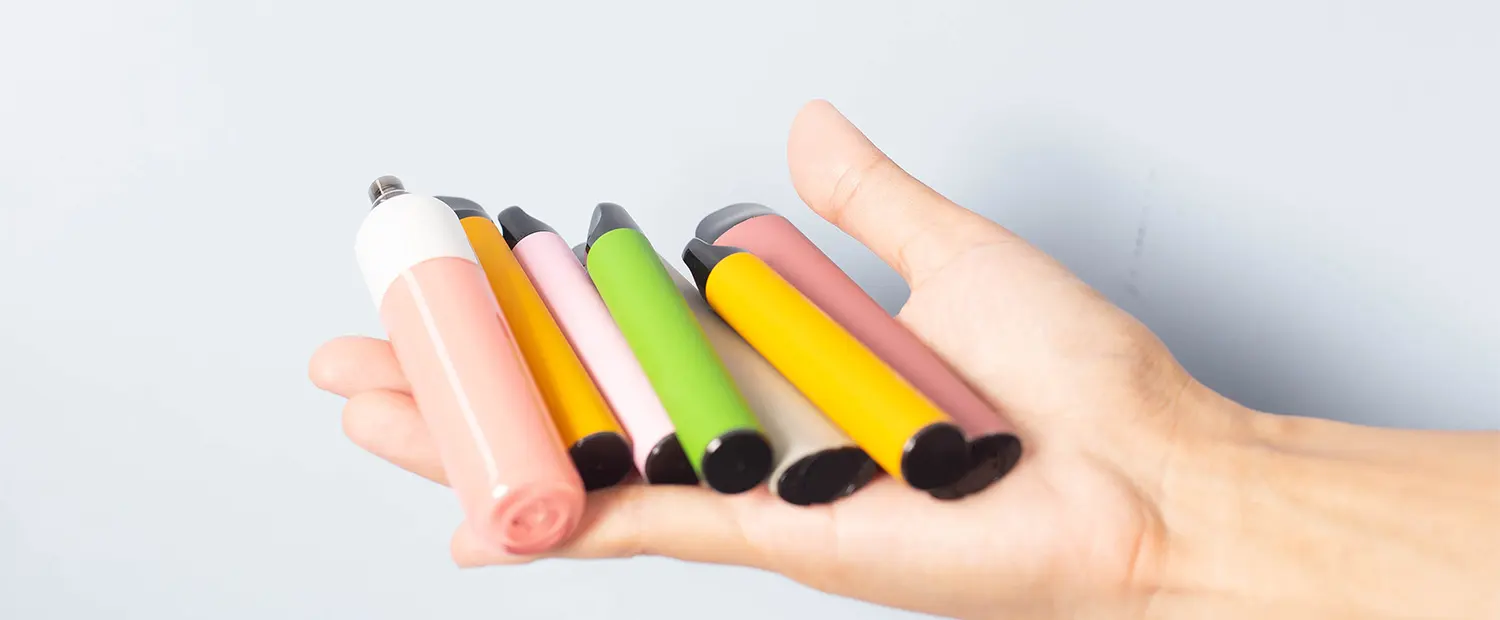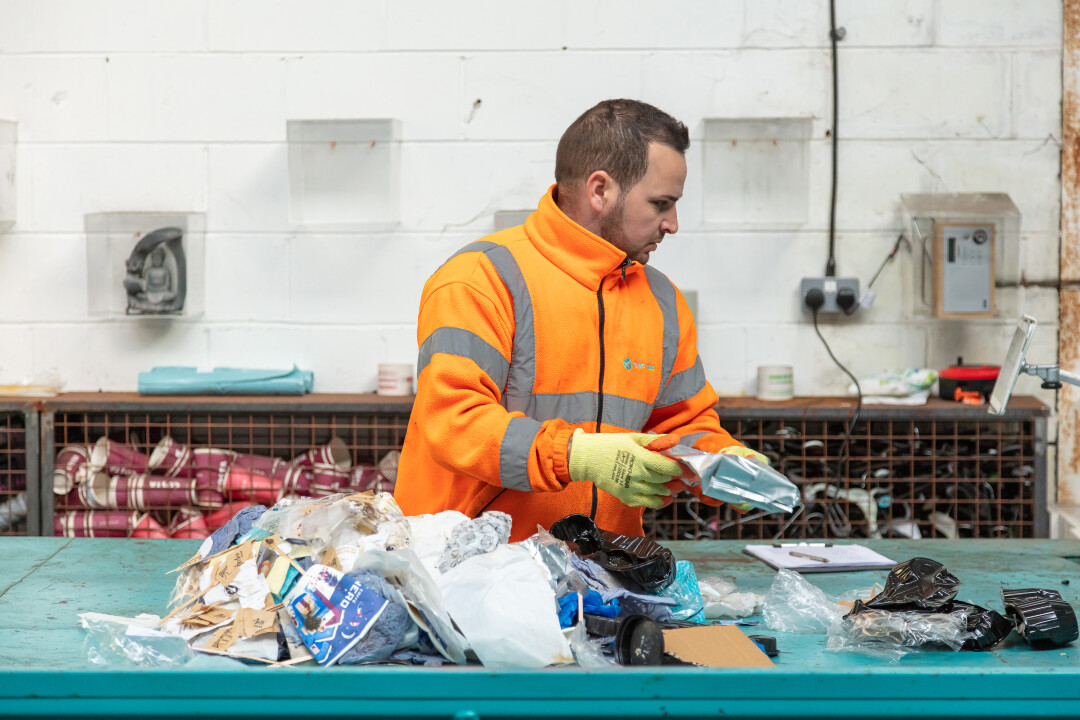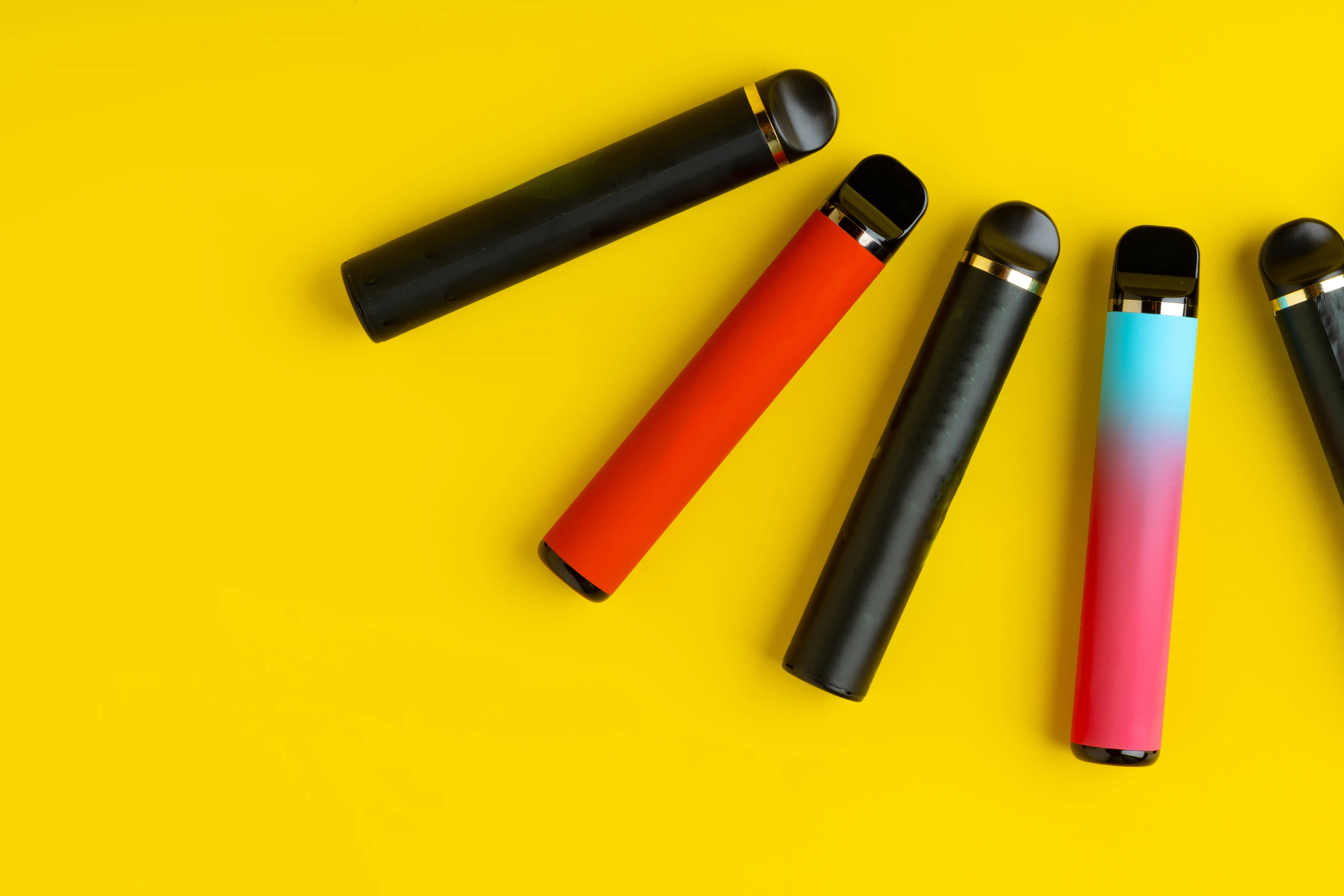In recent years, the popularity of disposable vapes has surged, offering a convenient and fuss-free option for nicotine and flavour enthusiasts.
However, what many vapers may not realise is the significant environmental cost associated with these disposable devices is why they are set to be banned in the UK.
What is a disposable vape?
A disposable vape is a type of electronic cigarette that is pre-charged and pre-filled with e-liquid. It is designed to be used once and then discarded. Disposable vapes are typically small and lightweight, making them easy to carry around. They also seem inexpensive, which makes them a popular choice for new vapers and young people who are looking for a convenient vaping option.
Disposable vapes work the same way as other types of electronic cigarettes. When you inhale, the battery powers the atomizer, which heats the e-liquid and turns it into vapour. You then inhale the vapour.
Disposable vapes come in a variety of flavours and nicotine strengths. You can also find disposable vapes with different features, such as adjustable airflow and LED lights.
Are disposable vapes bad?

Disposable vapes have become increasingly popular in the UK in recent years, but they are a convenient option with a hidden cost. The number of vaping products purchased is part of a growing trend in the United Kingdom with a total of 7 million single-use vapes being purchased every week in the UK. It's estimated that only 17% are properly recycled.
One of the biggest problems with disposable vapes is their environmental impact. Disposable vapes are designed to be used once and then discarded. This means that a large amount of waste is produced from disposable vapes. In 2022, it was estimated that over 1.3 million disposable vapes thrown away every day in the UK. This is a significant amount of waste, and it is only increasing.
Disposable vapes are made from a variety of materials, including lithium-ion batteries, plastics, and metals. These materials can be difficult to recycle and can pollute the environment if they are not disposed of properly.
Another problem with disposable vapes is their cost. Disposable vapes may be inexpensive upfront, but they can be expensive in the long run. If you use disposable vapes regularly, you will spend a significant amount of money on them. Rechargeable vapes are a more cost-effective option in the long run.
In addition to their environmental impact and cost, disposable vapes also have a number of other problems. Disposable vapes are not as safe as other types of electronic cigarettes. Some disposable vapes have been found to contain harmful chemicals, such as heavy metals and ultrafine particles. Disposable vapes are also addictive. Nicotine is a highly addictive substance, and disposable vapes can deliver high levels of nicotine. This can make it difficult for people to quit vaping.
Single-use vapes vs rechargeable vapes
Rechargeable vapes have a number of environmental advantages over disposable vapes.
-
Reduced waste: Rechargeable vapes can be used multiple times, while disposable vapes are thrown away after use.
-
Conserve resources: Rechargeable vapes use less resources, primarily less plastic waste, to produce than disposable vapes. This is because the materials used to make a rechargeable vape can be reused multiple times.
-
Reduced greenhouse gas emissions: The production of disposable vapes generates greenhouse gas emissions. Rechargeable vapes, on the other hand, produce fewer greenhouse gas emissions over their lifetime.
-
Reduced pollution: Disposable vapes can pollute the environment if they are not disposed of properly. Rechargeable vapes, on the other hand, are less likely to pollute the environment because they can be recycled.
Why Disposable Vapes are Bad for the Environment and Hard to Recycle

Disposable vapes, also known as e-cigarettes or e-cigs, have gained popularity due to their convenience, sleek design, and wide range of available flavours.
However, despite their apparent benefits, these devices pose a grave threat to the environment for several reasons.
Single-Use Plastics: Disposable vape devices are predominantly made of single-use plastics, which are not only resource-intensive to manufacture but also detrimental to the environment.
The plastics used in disposable vapes can take hundreds of years to decompose, contributing to the ever-growing plastic pollution crisis.
Hazardous Chemicals: The liquid contained in disposable vape cartridges often contains hazardous chemicals, including nicotine, which can leach into the environment if not properly disposed of.
This poses a risk to wildlife and can contaminate water sources.
Lack of Recycling Infrastructure: One of the main challenges in dealing with disposable vapes is the lack of a well-established recycling infrastructure for these devices.
Their intricate design and mixture of materials make them difficult to recycle through conventional means.
Battery Waste: In addition to the plastic waste, disposable vapes also contain lithium-ion batteries. These batteries, if not disposed of correctly, throwing vapes in the bin can be a fire hazard and release harmful chemicals when they break down.
Why Disposable Vapes are Set to be Banned in the UK
To address the environmental issues associated with disposable vapes, the UK government has taken decisive steps towards banning them. Several key factors contribute to this impending ban.
Environmental Concerns: The UK government, like many others around the world, is increasingly committed to addressing environmental issues, including plastic pollution and electronic waste. The surge in the use of disposable vapes runs counter to these goals.
Youth Vaping Epidemic: Disposable vapes have been heavily criticised for appealing to younger demographics due to their attractive designs and flavour options such as pink lemonade, menthol and strawberry, making them a popular alternative to smoking cigarettes. Concerns about rising youth vaping rates have prompted the government to take action to protect the younger generation's health.
Health Risks: The safety of the liquids used in disposable vapes is not always guaranteed, raising concerns about potential health risks. Regulating these devices and their contents is a priority for public health agencies.
Lack of Recycling Solutions: The absence of established recycling solutions for disposable vapes further emphasises the need for a ban. These devices contribute to electronic waste, which, when not properly managed or recycled, can harm both the environment and public health.
How businesses can recycle disposable vapes with our Batteries Recycling stream
At First Mile, we are committed to promoting responsible waste management and recycling practices. To address the environmental issues associated with disposable vapes and their batteries, we have established a dedicated recycling stream that allows people to dispose of their e-waste safely and sustainably.
Can you recycle disposable vapes?

There are a few reasons why it is difficult to recycle vapes, especially disposable vapes.
-
Vapes contain a variety of materials. Disposable vapes typically contain a variety of materials, including lithium-ion batteries, plastics, metals, and cotton. It can be difficult to separate these materials with your household waste recycling, so that they can be recycled individually at a local recycling facility.
-
Batteries are hazardous waste. Electrical items containing lithium-ion batteries can be dangerous if they are not handled properly. They can cause fires if they are punctured or crushed.
-
Vapes are not always recycled properly. Even if you take your vape to a local recycling center, there is no guarantee that it will be recycled properly. Some recycling centers do not have the equipment to offer a dedicated disposable vapes recycling stream.
As a result of these challenges, it is best to avoid disposable vapes altogether if possible. If you do use a disposable vape, make sure to dispose of it properly. Do not throw them into your household recycling bin or General Waste. Instead, take it to recycling centres that offer a disposables vapes recycling service.
Here's how you can recycle your disposable vape and their batteries through our batteries recycling stream:

At First Mile we have a dedicated vape recycling scheme scheme that ensures every component of the vape is recycled with our batteries recycling stream. Simply set up battery recycling bins around your business then use our battery sacks to arrange a collection.
Collect Your Disposable Vapes: Gather your used disposable vape devices and cartridges. You do not need to dismantle the device; we will separate them at our sorting facility.
Book a collection: Book a Batteries Recycling Collection on our website, you will then receive a Batteries sack which you can fill with your old batteries and vapes, then head to our Customer Portal to choose a collection time.
Environmentally-Friendly Recycling: Once collected, the disposable vapes are taken to our sorting facility, The Sacktory, where we carefully dismantle the devices to separate the materials. The plastics are processed for recycling, and the lithium-ion batteries are disposed of responsibly.
Environmental Benefits: By recycling your disposable vapes with us, you're helping to reduce electronic waste, decrease plastic pollution, and ensure that hazardous materials like lithium-ion batteries are handled safely and sustainably.
Overall, disposable vapes may offer convenience and variety, but they come at a considerable environmental cost. With the impending ban on disposable vapes in the UK, there is a growing awareness of the need to find sustainable alternatives and disposal methods.
First Mile is proud to offer a dedicated low-cost recycling stream to help individuals responsibly dispose of their disposable vapes and batteries, as well as other electrical waste using our WEEE (electrical waste and electronic equipment) recycling stream, contributing to a cleaner, greener future. Join us in protecting the environment and making a positive impact today.


